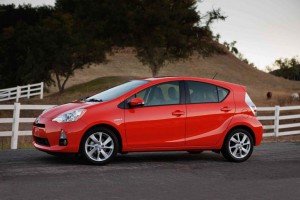
The calculator shows most drivers will need 5 years to recover the added cost of the Toyota Prius C.
The recent run-up in fuel prices led to a surge in demand for hybrids like the Toyota Prius, which has been selling at record levels. Yet sales of gas-electric vehicles still lag well behind what proponents keep forecasting, accounting for barely 3% of the overall U.S. new vehicle market.
Why? Well, that’s a matter of some debate, but for many potential buyers the issue is one of cost. While there are a few models that carry no premium for their advanced powertrains – such as the Lincoln MKZ – most hybrids are more expensive than comparable models using gas power alone. In some cases, the premium can be substantial, $5,000 or more.
And so, while those hybrids might quickly save you money on gas, it can take years to break even on your up-front investment – what industry types call the “payback period.”
Or will it? A new calculator created by the National Transportation Research Center at Oak Ridge National Laboratory is designed to make it easy to calculate your fuel savings – and determine the payback period.
Just launched on the fueleconomy.gov website, the calculator is designed to give you a true apples-to-apples comparison. That matters because in many cases, the folks at the NTRC gripe, people shopping for hybrids often do an apples-to-oranges evaluation, comparing hybrid models loaded up with features like navigation and high-end infotainment systems against an otherwise stripped-down version of the same nameplate.
(Click Here to access the hybrid calculator.)
The hybrid calculator, says the government, “looks at manufacturer’s suggested retail price (MSRP) and fuel cost for hybrids and non-hybrids with comparable styles and trim levels, and the results show that there are some hybrids that really do save money.”
The calculator considers a range of factors, allowing you to personalize the settings to reflect the number of miles you drive, how much of that is on the highway or around town, and then work in the price you estimate you’ll be paying for gas.
The best deals, it turns out, are for the Lincoln MKZ Hybrid and the Buick LaCrosse with eAssist. Both models carry the same MSRP whether you opt for the conventional gas or hybrid versions. If you log the typical 15,000 miles of driving each year, half of it on the highway, and expect to pay $3.75 a gallon your annual savings will work out to $732, so you’re saving money the money you drive off the dealer lot.
Perhaps surprisingly, one of the best deals is for the Cadillac Escalade, which gets a Combined 21 mpg compared with just 15 for the V-8 version, saving you an estimated $1,043 a year on fuel and covering the $2,175 hybrid model’s premium in just 2.1 years.
Comparing the Toyota Prius to the similar Toyota Matrix shows you’ll save $910 annually on gas but need 4.7 years for payback – only slightly better than the 4.9-year payback for the Hybrid version of the Ford Fusion.
Even though the Honda Insight makes a Combined 42 mpg compared to 31 for the similarly sized Honda Fit, the annual $446 savings on gas will need to be banked for 5.3 years to recover your added up-front investment of $2,375.
The more mileage you put on each year, the higher the percentage of time driving in the city and, of course, the more expensive your gas the bigger your savings and the shorter your payback.
Clock 18,000 miles, two-thirds of that in-town, pumping $4.25-a-gallon gas and the Insight’s annual savings surge to $654, with the payback period plunging to just 3.6 years.
The one thing missing from the calculator is a way to plug in incentives – like the current $1,500 discount on the eAssist version of the Buick LaCrosse. And you’d have to tweak the results if your local dealer were tacking on a premium, as has often been the case with the Prius during times when fuel prices were spiking.
There’s also the issue of investing your money up front. What’s it worth to have an extra, $2,000 or more tied up in a more expensive hybrid model, especially if you’re financing that figure at a high interest rate?
But the new calculator just may convince some folks that there’s a bigger advantage to going hybrid than first might appear.
